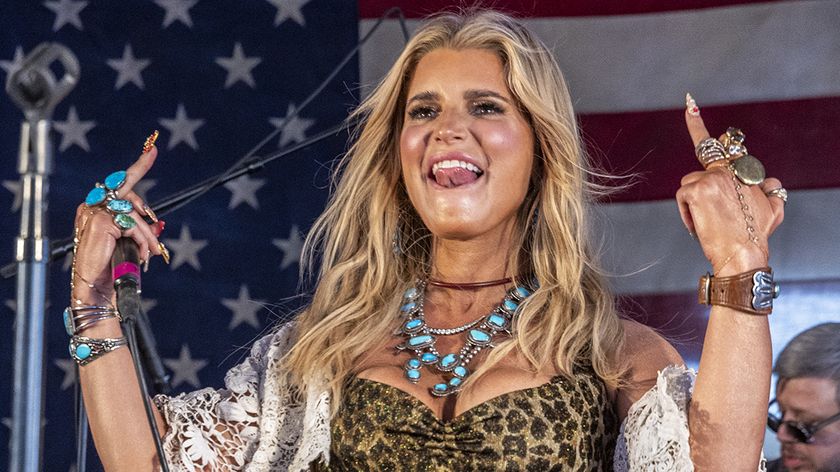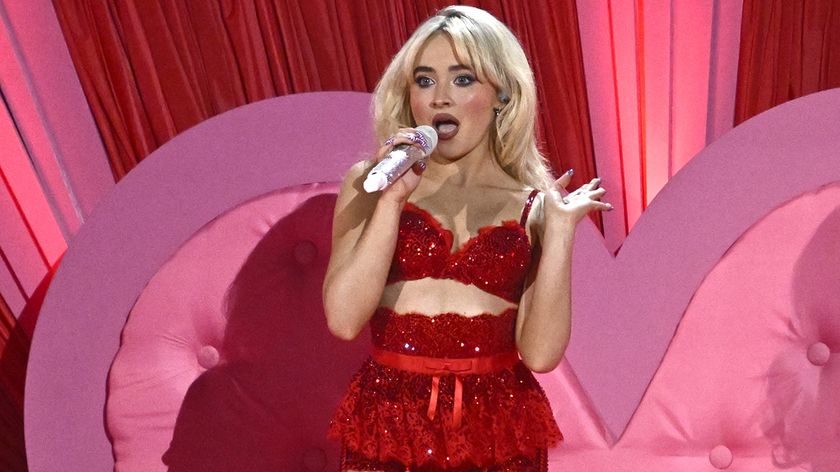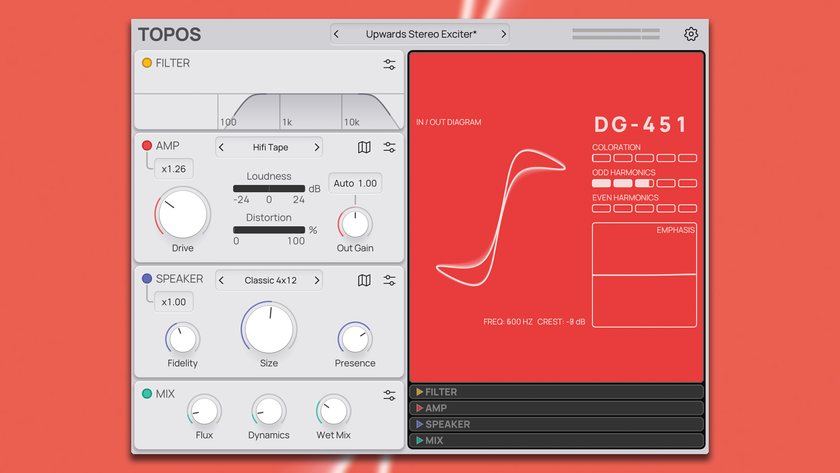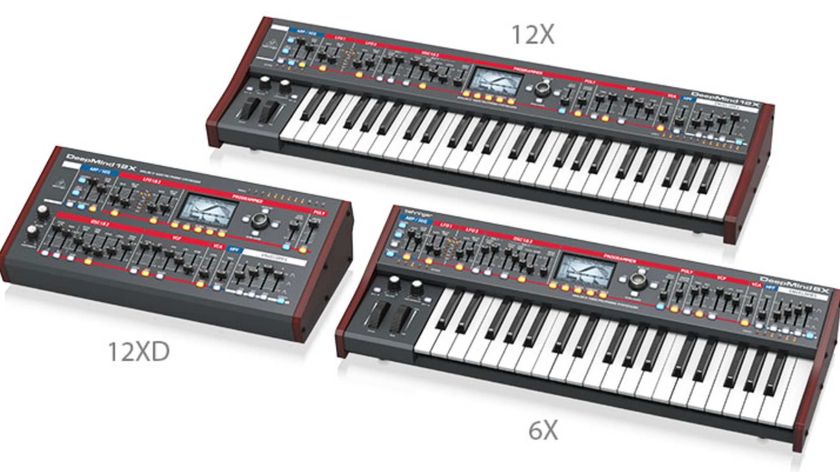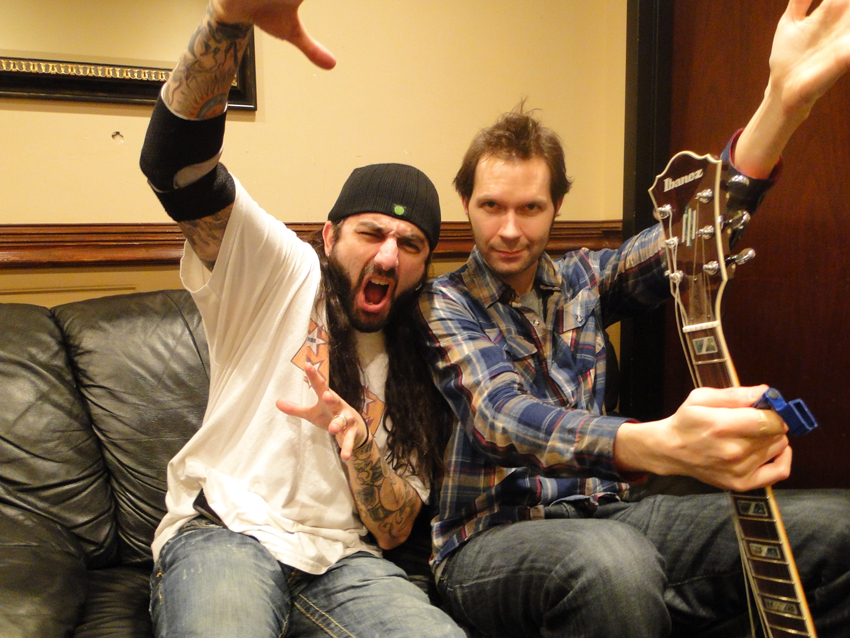
It's a little past 4pm as Yellow Matter Custard - guitarist Paul Gilbert, drummer Mike Portnoy, guitarist and keyboardist Neal Morse and bassist Kasim Sulton - dart into the BB Kings nightclub in New York City.
They're just flown in from Chicago, but airport delays and ever-snarled Manhattan traffic have put them an hour late for soundcheck. The much-loved, highly pedigreed Beatles tribute band, who have reformed after an eight-year absence (ex-Utopia member Sulton is a replacement for original Custard bassist Matt Bissonette, who is currently touring with Rick Springfield), quickly take to the stage and get down to the matter at hand.
And when it comes to hands - or, more specifically, fingers - Paul Gilbert has serious business to tend to, and it involves the use of Krazy Glue. In what could have been a tour-ending mishap, the guitarist, just days before the group's first rehearsal, sliced open the middle finger of his left hand with an X-Acto blade. "I was cutting some foam to pack Kasim's bass in, and I put the knife through my finger," he says. "I was amazed that it didn't even bleed. But there was this flap of skin hanging off. Turns out, it was my callus. So while it didn't bleed, it was horribly painful, which has forced me to go the Stevie Ray Vaughan route with the Krazy Glue." [It's been documented that the late bluesman Vaughan relied on Krazy Glue to seal similar injuries before shows.]
Asked if he thought Gilbert's blade run-in would endanger the Custard gigs, Portnoy chuckles and says matter-of-factly, "No - because he's Paul Gilbert." And he's right: two gigs down, one to go, and Gilbert's hanging right in there. Solos have posed no problem for the shredtastic guitar star. "I can rip through 'em, and I'm fine," Gilbert says. "But chords are a different matter altogether. Those cursed E7s have a way of ripping right through my finger. Four songs with E7s is all it takes. And The Beatles loved their E7 chords."
A little dab of the sticky stuff applied to his still-smarting digit and Gilbert is "ready to play some Beatles." Briskly, he unpacks his guitars (an Ibanez AS-103, modified to look like a 1965 Epiphone Casino, along with a 1990 Ibanez Custom Shop 12-string) and sets up his pedalboard. "No roadies on this tour," he says. "We're doing this old school."
It was in 2003 that Yellow Matter Custard played but a smattering of gigs (Portnoy and Gilbert would later team up for more tribute bands, Amazing Journey, Hammer Of The Gods and Cygnus And The Sea Monsters, honoring, respectively, The Who, Led Zeppelin and Rush). Over the years, however, something strange happened: interest in the band grew, with fans from across the globe begging and blogging for a reunion. And then, late last year, right after MusicRadar published an interview with Portnoy (part of a conversation recorded during the summer of 2010) in which he discussed The Beatles and Yellow Matter Custard, the drummer announced that they were getting back together for a three-show run (LA, Chicago and NYC). Talk about your coinkydinks!
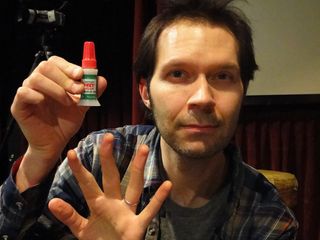
The man's a pro: Paul Gilbert, pre-soundcheck, about to Krazy Glue a nasty slice on his finger. © Joe Bosso
Get the MusicRadar Newsletter
Want all the hottest music and gear news, reviews, deals, features and more, direct to your inbox? Sign up here.
"That was very funny timing," Portnoy tells me. "I remember doing that interview with you, not knowing at the time that we would be getting back together. And just as I was planning the whole thing, the interview was posted. It was strange, but it was pretty cool."
Time is tight. All four musicians make speedy tweaks to their instruments and gear (Portnoy is playing a custom-built Tama 'Ringo' kit for these shows - the four-piece setup is a far cry from the massive wall of drums that fans are accustomed to see him sit behind), and before you can say "toppermost of the poppermost," they blast through four of the nearly 40(!) Beatles tunes they'll play for tonight's sold-out show: set-opener Back In The USSR, Lady Madonna (Morse tests his keyboard sound on this number), The Word and Paperback Writer. As one would expect, the group packs a considerable wallop musically, but it's their final microphone check, a brief a capella rendering of Because (part of an Abbey Road medley they'll perform) that truly astonishes. Make no mistake: these guys don't just have chops, they have pipes, too.
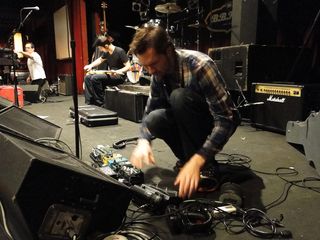
It only looks complicated. Gilbert hooks up his pedalboard.© Joe Bosso
Satisfied with their onstage mix, the band takes a 20-minute dinner break, after which Portnoy and Gilbert kick back in a dressing room to talk to MusicRadar about The Beatles and why Yellow Matter Custard have, ahem, 'come together' after eight years apart.
What was the impetus for this reunion?
Mike Portnoy: "I thought the first one was so much fun. Paul and I have done four tribute bands together, but The Beatles one was first. And The Beatles' catalogue is so huge that even the first time around, when we did 30 songs, you're really only scratching the surface.
"I would always hear Baby, You're A Rich Man or Savoy Truffle, and I'd be like, 'Oh man, we should've done that!' And it just seemed like the time was right. I have some available time in my schedule now without Dream Theater in my life, and I have a wish list of things I want to do this year, and I figured that doing another Beatles tribute would give me some fun. I need a lighthearted bit of musical enjoyment in my life right now."
Kasim sounded great during soundcheck. When you found out that Matt couldn't make it this time, how did Kasim come to into the fold?
Portnoy: [gestures to Gilbert] "He sent me an e-mail…"
Paul Gilbert: "'Two words: Kasim Sulton.' I've been a Utopia fan for a long, long time, and Kasim's a pop hero of mine. I have to hold myself back from asking him a million Utopia questions. But it's really a blast to get a great mix on stage and hear my own voice with Kasim's. And Neal, too, he's one of my favorite singers. Mostly, I'm much more of a guitar player than I am a singer. I love to sing, but I'm not on those guys' level. I'm very lucky that they let me play in their sandbox."
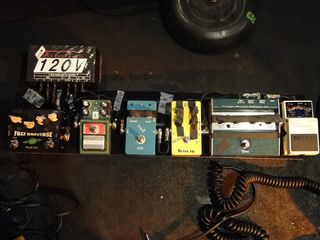
Paul Gilbert's effects pedalboard: (top and l to r): Voodoo Lab Pedal Power AC supply, Magic Box Fuzz Universe, modified Ibanez Tube Screamer, HBE CPR compressor, HBE Detox EQ, Fulltone Choral Flange, Boss tuner (not pictured: Hughes & Kettner Tube Rotosphere) © Joe Bosso
With Kasim in the band, along with the fact that you haven't played together in a while, have you noticed a big difference in how you sound?
Portnoy: "I think the only difference is that Kasim's vocal range allows us to do more Paul McCartney songs. Matt Bissonette's range is similar to my range, and Paul and Neal's, too, so at first we were able to do a lot of John, Paul and Ringo songs. There were a lot of McCartney things we couldn't do. But with Kasim, we can do Lady Madonna and Getting Better and Paperback Writer and She's A Woman - all of these songs that were out of our ranges the first time around. That's the biggest difference."
There's so many Beatles tribute bands - some of them are quite professional, and then you have your weekend warrior-type groups in every city. What do you think sets you apart from everybody else?
Gilbert: "Hmmm. I've never thought about that..."
Portnoy: "I think there's two things: We're all notable players from other bands. You know, you don't see guys like Sebastian Bach getting together with Scott Ian and Jason Bonham to do Beatles tributes. So I think the fact that we're all name players sets us apart. And then Paul Gilbert and I come from backgrounds that are so different from what Beatles music is generally known for - that makes it different, too.
"The other factor is our setlist. Most Beatles tribute bands from here to Tokyo are doing She Loves You, I Want To Hold Your Hand, Yesterday, whereas with us, I think it's cooler to dig deeper into the catalogue. Who else does Think For Yourself or You Know My Name, Look Up The Number"?
Before you get together as a band to rehearse, what kind of individual homework do you do? Do you go on YouTube and listen to The Beatles isolated tracks to learn parts? Do you try to nail the songs exactly, or are you more about interpreting the music your own way?
Gilbert: "The tricky songs for me are the ones without guitar, like Penny Lane and Fool On The Hill. Fool On The Hill has something like six acoustic notes. But Penny Lane, there's not a note of guitar on that. But there's a really cool trumpet solo, so I learned how to do that on the guitar. There's so many little George Harrison solos, however, and you can't improvise them. The one at the end of the Abbey Road medley, you have to nail that."
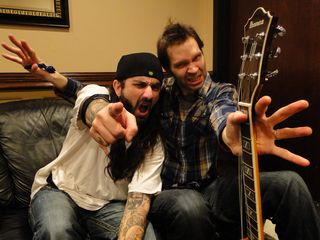
Portnoy and Gilbert backstage, raving about "those darn, clever Beatles." © Joe Bosso
Let's talk about the setlist. Mike, you and I discussed this last year when you said that, if you ever did Yellow Matter Custard again, you wanted to dig into The Beatles' middle period: Rubber Soul, Revolver…
Portnoy: "Yeah, and we didn't do that! [laughs] It's a pretty scattered setlist. We went about picking the songs the same way we did before: I came up with a master list of 50 songs that I would love to cover, and I e-mailed them and told everybody to pick 25. Any song that got four votes was automatically in. Then we went to the three-vote songs and on down. The way I picked the master list was basically songs that I haven't seen other groups cover, things like Savoy Truffle and Flying."
Were there any songs that you really wanted to do that didn't get the necessary amount of votes?
Portnoy: "Baby, You're A Rich Man - nobody picked it, for the second time in a row. And Hey Bulldog…Paul, did anybody vote on that one?"
Gilbert: "I wanted to do it. Neal didn't want to."
Portnoy: "Neal had a few that he specifically didn't want to do, like Happiness Is A Warm Gun, which I really wanted to play. Sexy Sadie, Only A Northern Song...there were a few. But there's not a single repeat of any song we did in 2003. That was my plan from the beginning.
"And we're doing almost 40 songs, too! That's 70 songs we've covered now. You'd think we'd be starting to get to the depths of the really bad songs, but I could pick another 30 and they would still be amazing."
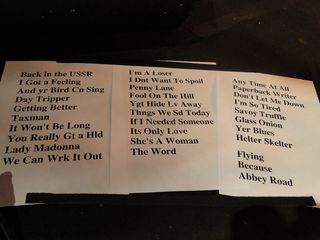
Yellow Matter Custard's setlist. Portnoy says they could do 30 more and they'd still be winners. © Joe Bosso
To prepare 40 songs for this show, how much rehearsal time did you have?
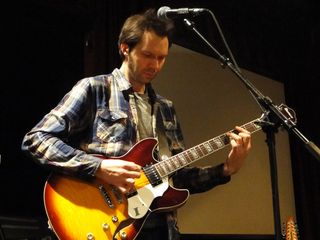
Gilbert, staying away from that dreaded E7 chord. © Joe Bosso
Gilbert: "Two days. It was an intense two days, but it was very gratifying. And everybody did do their homework. We'd get together - 'Let's try this one. One-two-three-four!' We'd play it, and it sounded great right off the bat."
Something people don't talk about enough is what great singers The Beatles were. They were an incredible vocal band. How much attention do you place on getting the vocals and harmonies right?
Portnoy: "Playing the music is easy. The majority of our rehearsals was figuring out who was going to sing what and distributing the tunes. We're not singing by character, so we're picking who should tackle what song and getting the vocals right - that was the challenge. Once the master list was laid out and the setlist was chosen, everybody started checking off their preferences and the songs they wanted to sing. But it wasn't until we got in a room together that we figured out how to make it all work."
As a drummer, Mike, does it feel strange to play such a minimal kit? You're known for playing some pretty massive setups.
Portnoy: "It doesn't feel strange, because this is the kind of kit I started on. I love playing on small kits. Other than Dream Theater, most of the side projects have involved small kits - maybe not this small. But I really enjoy it. The only difference here is that I'm using one bass drum pedal. I always play with a double pedal. This and the Zeppelin tribute have been the only times I've used only one bass drum and one a pedal."
Why do you feel that Ringo is often maligned as a drummer?
Portnoy: "I mentioned this at the Chicago show yesterday, and I think this sums it up. I never listened to the drums in Penny Lane, for instance. I've been listening to that song for 40-something years. Heard it a million times, know the song inside and out musically, melodically, the production… I didn't pay attention to the drumming until I had to learn the drums for this. And I listened to the drumming in the song...it's genius. He's playing the most perfect part.
"It's not about how Ringo played; it's about what he played, and what he played for the song. He was perfect for the band, and quite groundbreaking. You know, until then, there weren't any drummers that were playing what he was playing. If you watch those early '64 recordings, he's really digging in and playing with a lot of fire. And then the Keith Moons and John Bonhams and Mitch Mitchells and Ginger Bakers came along, and everybody started to disregard Ringo.
"But Ringo's inventiveness on Penny Lane, for instance, and the way he applied the drums…and if you listen to Lady Madonna, there's two different drum tracks going on there. I had to figure out what to play for this gig, because one track's doing a shuffle [imitates the sound], and then the other's going [imitates a pounding floor tom]. And in every Beatles song, you'll hear tambourines and cowbells and all of these inventive applications of drumming and percussion. Some of that might have been George Martin, but ultimately, Ringo was doing it. He gets all the credit in the world in my book for doing that."
And Paul, being that you're the lead guitarist, in delving into The Beatles' catalogue and playing it live, what have you discovered about George Harrison?
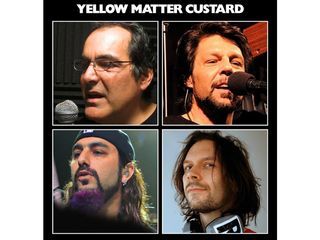
Meet The Custard: (from top, l to r), Neal Morse, Kasim Sulton, Mike Portnoy, Paul Gilbert
Gilbert: "There's a lot of upbeats. She's A Woman - when you first hear it, you're deceived into thinking they're downbeats, but as soon as the band comes in, you realize it's all on the up. The Word…he's playing on the syncopated rhythm, rather than the down. There's a lot of space. And the soloing stuff, I mean, there's definitely a lot of '60s players who were influenced by the blues guys, and George is no exception. If you listen to some of the stuff he played on Abbey Road, there's some great blues lines.
"As a person who comes from a metal, play-as-fast-as-you-can background, he always blows my mind. I'll sit down and try to figure out what he's doing, and I'll be like, 'Oh, I can play that.' And I can. But then I'll quiz myself later on and see if I can remember it, and I'll listen to it again and I'll go, 'It was simpler than what I just tried to do.' That's the thing that kills me: I wouldn't have thought of it, and he did.
"I think all of The Beatles were from an era when certainly playing was important to them, and they were cutting edge. But for all time, they're master composers. When I go back and hear how the songs were arranged, especially considering the generation I'm from - the Led Zeppelin/Van Halen, one bass, one guitar track, drummer, some vocals, and that's kind of everything...The Beatles had a lot more going on. There's piano, a couple of guitar parts, percussion… And this blows my mind, because I don't have enough brainspace to arrange that in myself.
"I actually got angry. I was listening to them and I went [slaps his knee], 'They're so clever! Why I can't I be that clever?' Listening to them, I've felt outsmarted a lot of times. [Portnoy laughs] 'Those darn, clever Beatles got me again! I wouldn't have thought of that. If I would've written that song, I'd have put in some bonehead chords and be doing downbeats the whole time, too much distortion…'"
Portnoy: "On their early albums, they sound like a live band because they were a live band. And Let It Be is very much like that, because that's what they were trying to get at. But then if you listen to Rubber Soul, Revolver, Sgt. Pepper, Magical Mystery Tour, 'The White Album,' I mean, the layers there…and Abbey Road, too. There's so much depth. They broke every rule in the book, and they rewrote a whole new book of rules, and nobody's been able to top it."
You've kind of touched on this, but in bringing The Beatles' music to the stage, are you amazed at what they accomplished in such a short period of time?
Portnoy: "The length of time is astonishing. From She Loves You to Tomorrow Never Knows is only three years. That's unbelievable. You look at the clean-cut guys on Ed Sullivan in 1964, and then in '67 and '68 they're full-blown hippies with beards and long hair - and that's only three years later! They accomplished, in seven years or so, what most bands don't - musically, personally or stylistically - over a 30-year career."
Gilbert: "They must've been courageous or naïve or who knows what? Just imagine: You're the biggest band in the world, every girl wants you, and you decide, 'We're going to make this album sound totally different from the last one.' Any business manager around would've said, 'What are you doing? This is working! Don't change. Keep the suits on, keep writing the same stuff.' But The Beatles were like [shrugs], 'No, we're gonna do something different.'"
Joe is a freelance journalist who has, over the past few decades, interviewed hundreds of guitarists for Guitar World, Guitar Player, MusicRadar and Classic Rock. He is also a former editor of Guitar World, contributing writer for Guitar Aficionado and VP of A&R for Island Records. He’s an enthusiastic guitarist, but he’s nowhere near the likes of the people he interviews. Surprisingly, his skills are more suited to the drums. If you need a drummer for your Beatles tribute band, look him up.
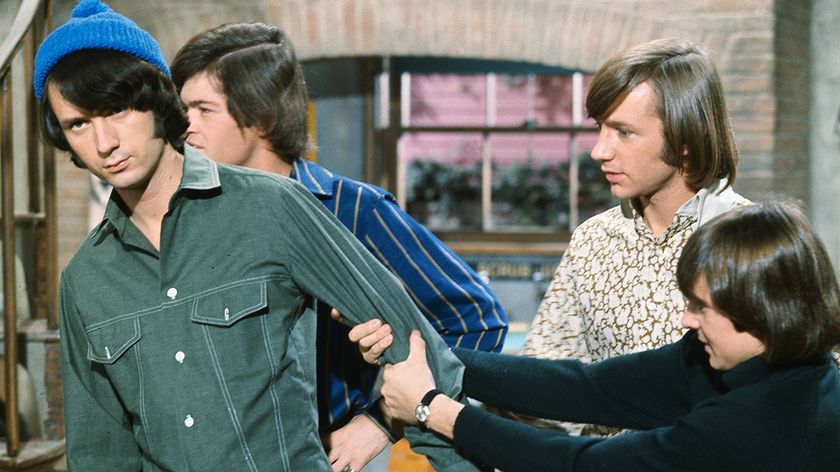
"They said, ‘Thank you, but no thank you - it’s not a Monkees song.’ He said, ‘Wait a minute, I am one of the Monkees! What are you talking about?’": Micky Dolenz explains Mike Nesmith's "frustration" at being in The Monkees
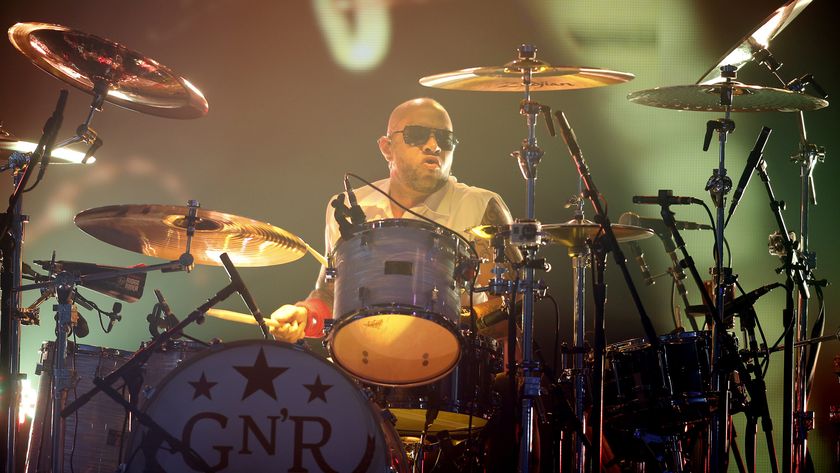
“There’s nights where I think, ‘If we don’t get to Paradise City soon I’m going to pass out!’”: How drummer Frank Ferrer powered Guns N’ Roses for 19 years


